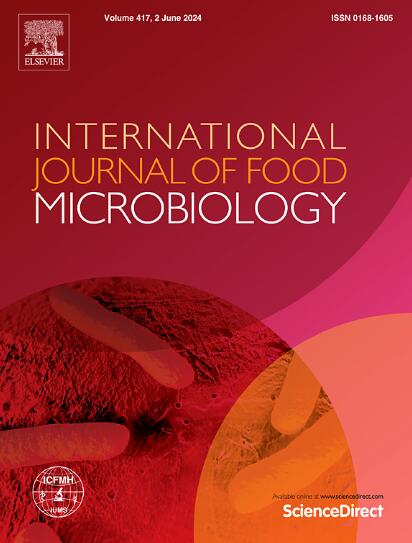Isolation, genomic characterization and biocontrol potential of the lytic Pectobacterium phage Pcc_P10 against soft rot of pepper fruits
IF 5.2
1区 农林科学
Q1 FOOD SCIENCE & TECHNOLOGY
International journal of food microbiology
Pub Date : 2025-07-21
DOI:10.1016/j.ijfoodmicro.2025.111360
引用次数: 0
Abstract
Pectobacterium carotovorum (PBC) is a major plant pathogen responsible for soft rot disease in peppers, and its prevention and control remain highly challenging. In this study, a novel lytic phage targeting Pectobacterium carotovorum subsp. carotovorum (PCC), designated as Pcc_P10, belonging to the Pektosvirus genus within the Autographiviridae order, was isolated and characterized. The dsDNA genome sequence of Pcc_P10 was 39,637 bp with 49.1 % GC content, encoding 46 open reading frames without tRNA genes and virulence factor genes. Pcc_P10 exhibits specific lytic activity lysing only PCC among a panel of tested bacterial species. Compared to previously reported Pectobacterium phages, Pcc_P10 exhibits a uniquely broad pH tolerance (5–11), a shorter latent period with rapid lytic activity, and a compact genome devoid of tRNA and virulence genes, highlighting its robustness, efficiency, and biosafety as a biocontrol agent. In vitro assays revealed that Pcc_P10 significantly inhibits bacterial growth and disrupts biofilm formation, which has strong potential as a biocontrol agent. In vivo application of Pcc_P10 to infected green peppers resulted in a substantial reduction in soft rot symptoms and a concomitant decrease in PCC populations, demonstrating its efficacy as a biocontrol agent under experimental conditions. Given the growing global concerns regarding the environmental impact and sustainability of chemical pesticides, these findings support Pcc_P10 as a promising candidate for the development of sustainable biocontrol strategies against pepper soft rot.
辣椒果实软腐病病原菌Pcc_P10的分离、基因组鉴定及其防制潜力
胡萝卜乳杆菌(Pectobacterium carotovorum, PBC)是引起辣椒软腐病的主要植物病原菌,其防治仍具有很高的挑战性。在这项研究中,一种新的靶向胡萝卜乳杆菌的噬菌体。对自噬病毒科pektovirus属的cartovorum (PCC)进行了分离鉴定,编号为Pcc_P10。Pcc_P10的dsDNA基因组序列为39,637 bp, GC含量为49.1%,编码46个不含tRNA基因和毒力因子基因的开放阅读框。Pcc_P10表现出特定的裂解活性,在一组被测细菌中只裂解PCC。与之前报道的大肠杆菌噬菌体相比,Pcc_P10表现出独特的广泛的pH耐受性(5-11),较短的潜伏期和快速的裂解活性,紧凑的基因组缺乏tRNA和毒力基因,突出了其作为生物防治剂的稳健性,有效性和生物安全性。体外实验表明,Pcc_P10能显著抑制细菌生长,破坏生物膜的形成,具有很强的生物防治潜力。在体内将Pcc_P10应用于受感染的青椒后,软腐病症状显著减轻,PCC种群数量随之减少,证明了其作为一种生物防治剂在实验条件下的有效性。鉴于全球对化学农药环境影响和可持续性的关注日益增加,这些研究结果支持Pcc_P10作为辣椒软腐病可持续生物防治策略的有前景的候选物。
本文章由计算机程序翻译,如有差异,请以英文原文为准。
求助全文
约1分钟内获得全文
求助全文
来源期刊
CiteScore
10.40
自引率
5.60%
发文量
322
审稿时长
65 days
期刊介绍:
The International Journal of Food Microbiology publishes papers dealing with all aspects of food microbiology. Articles must present information that is novel, has high impact and interest, and is of high scientific quality. They should provide scientific or technological advancement in the specific field of interest of the journal and enhance its strong international reputation. Preliminary or confirmatory results as well as contributions not strictly related to food microbiology will not be considered for publication.

 求助内容:
求助内容: 应助结果提醒方式:
应助结果提醒方式:


